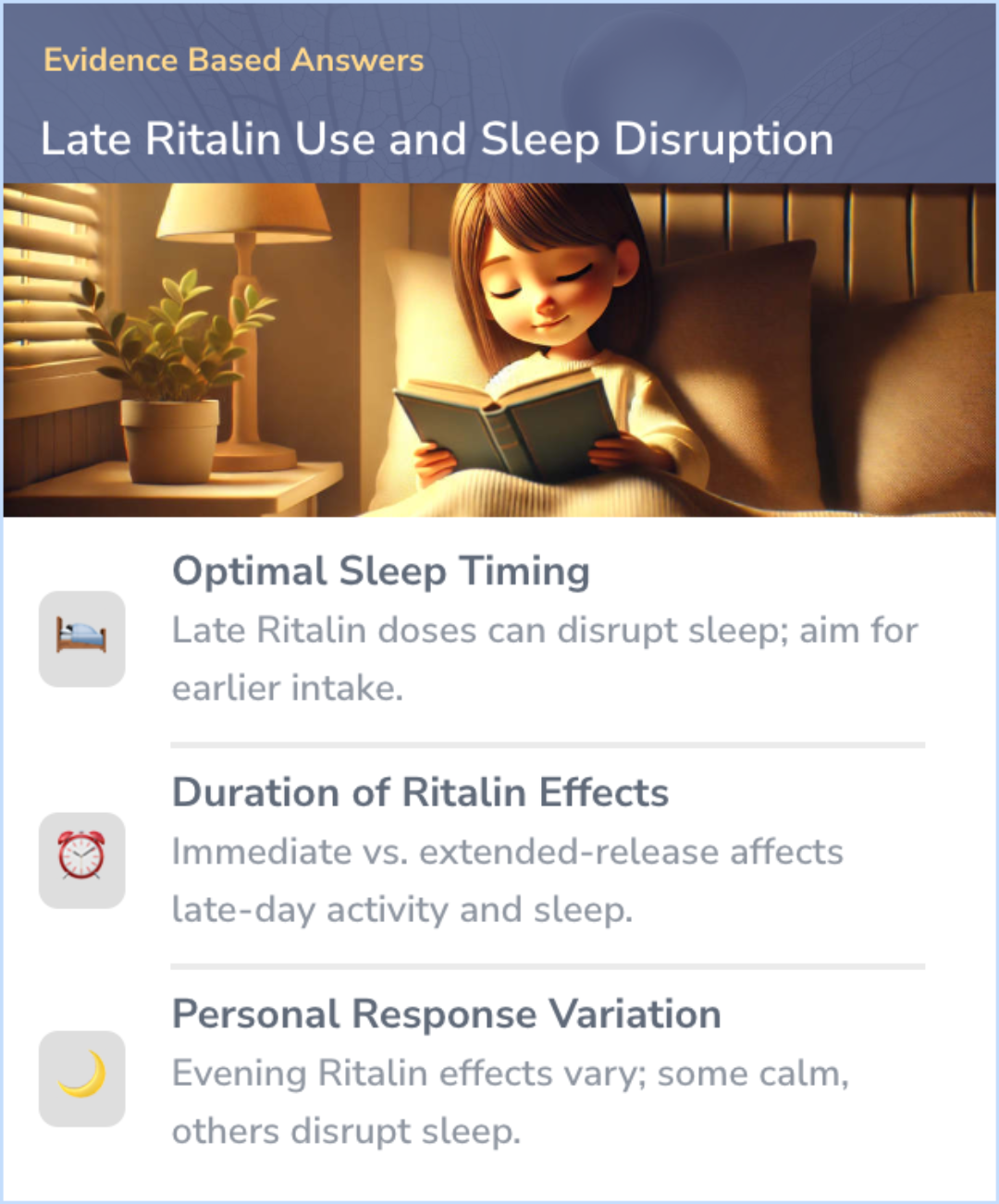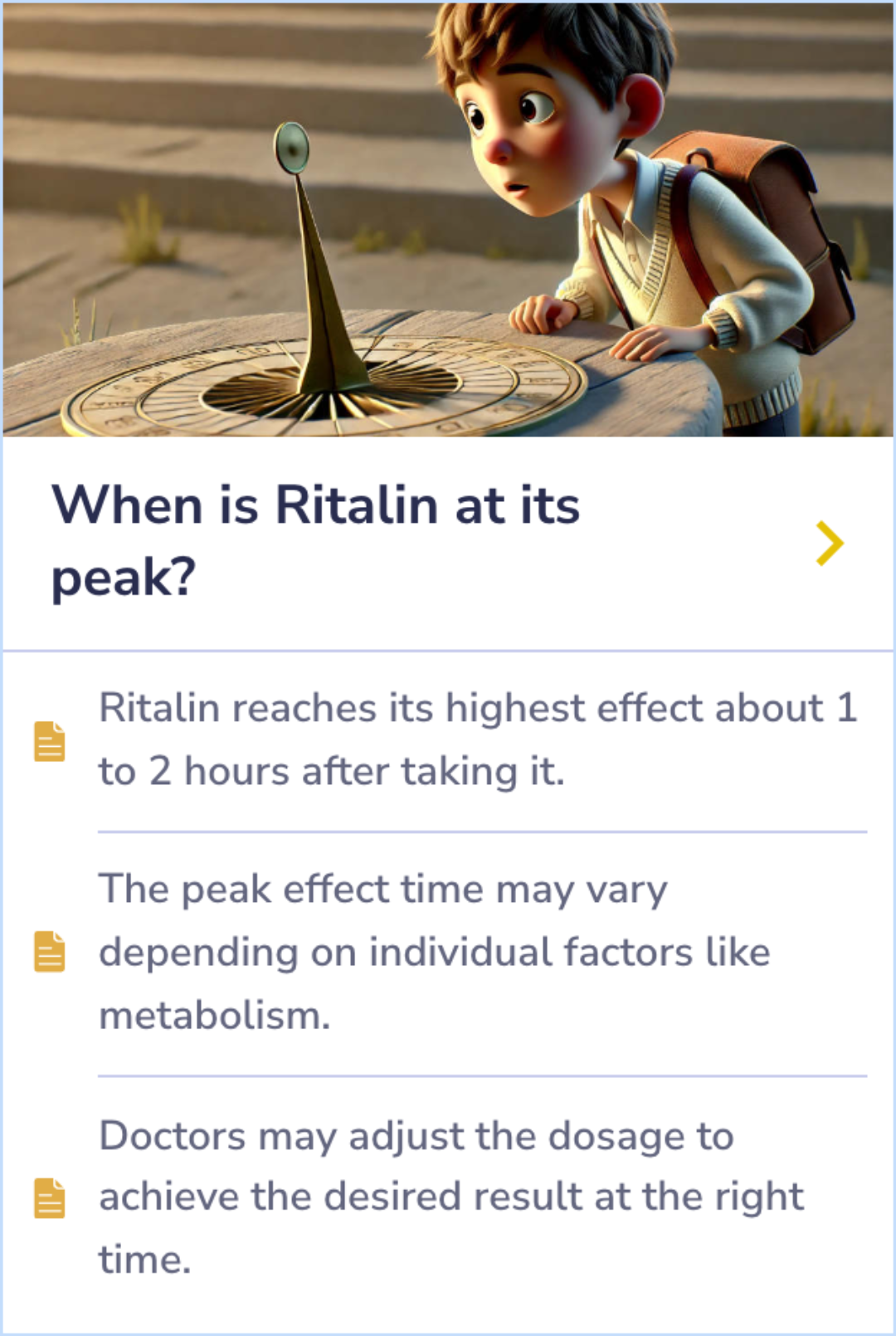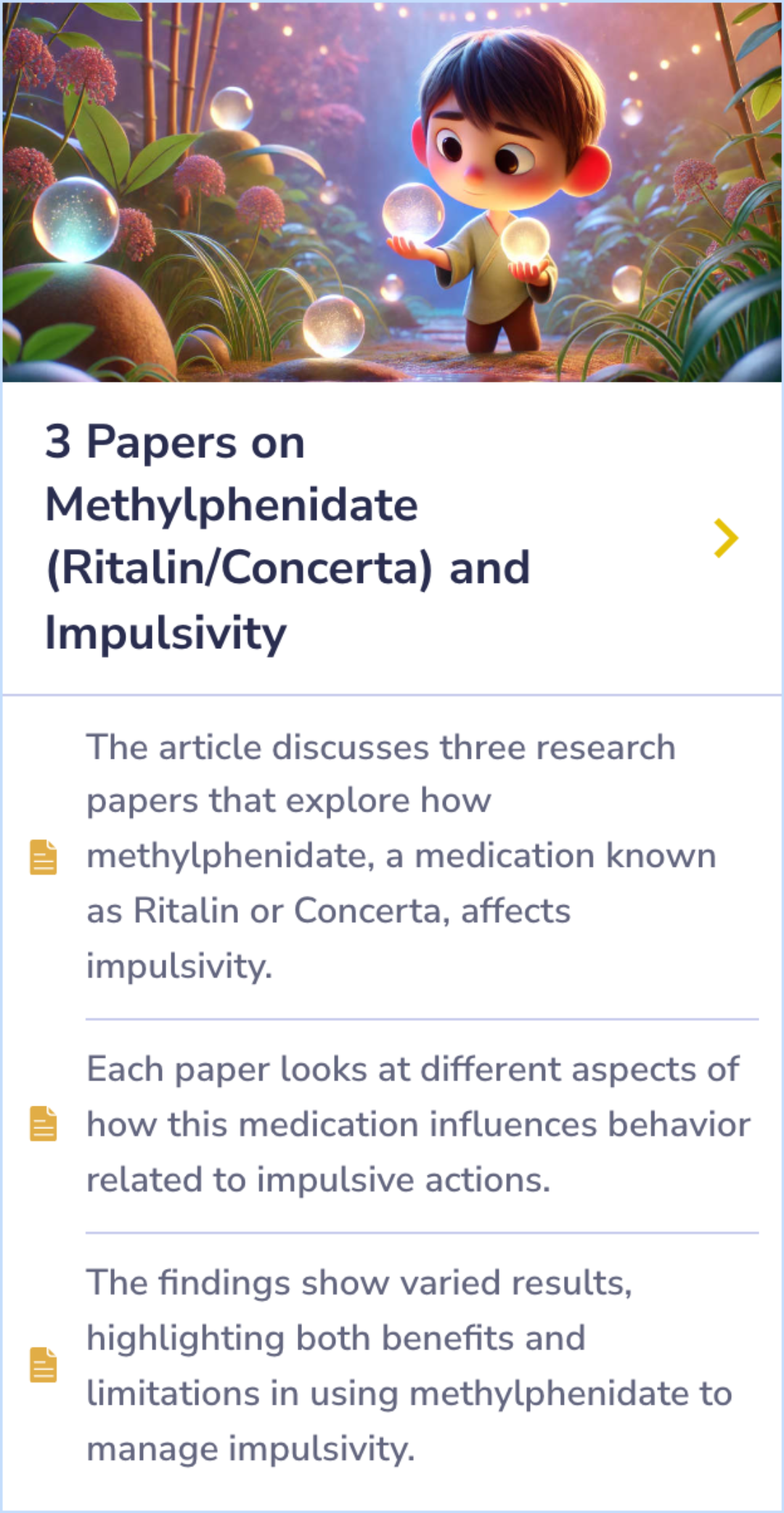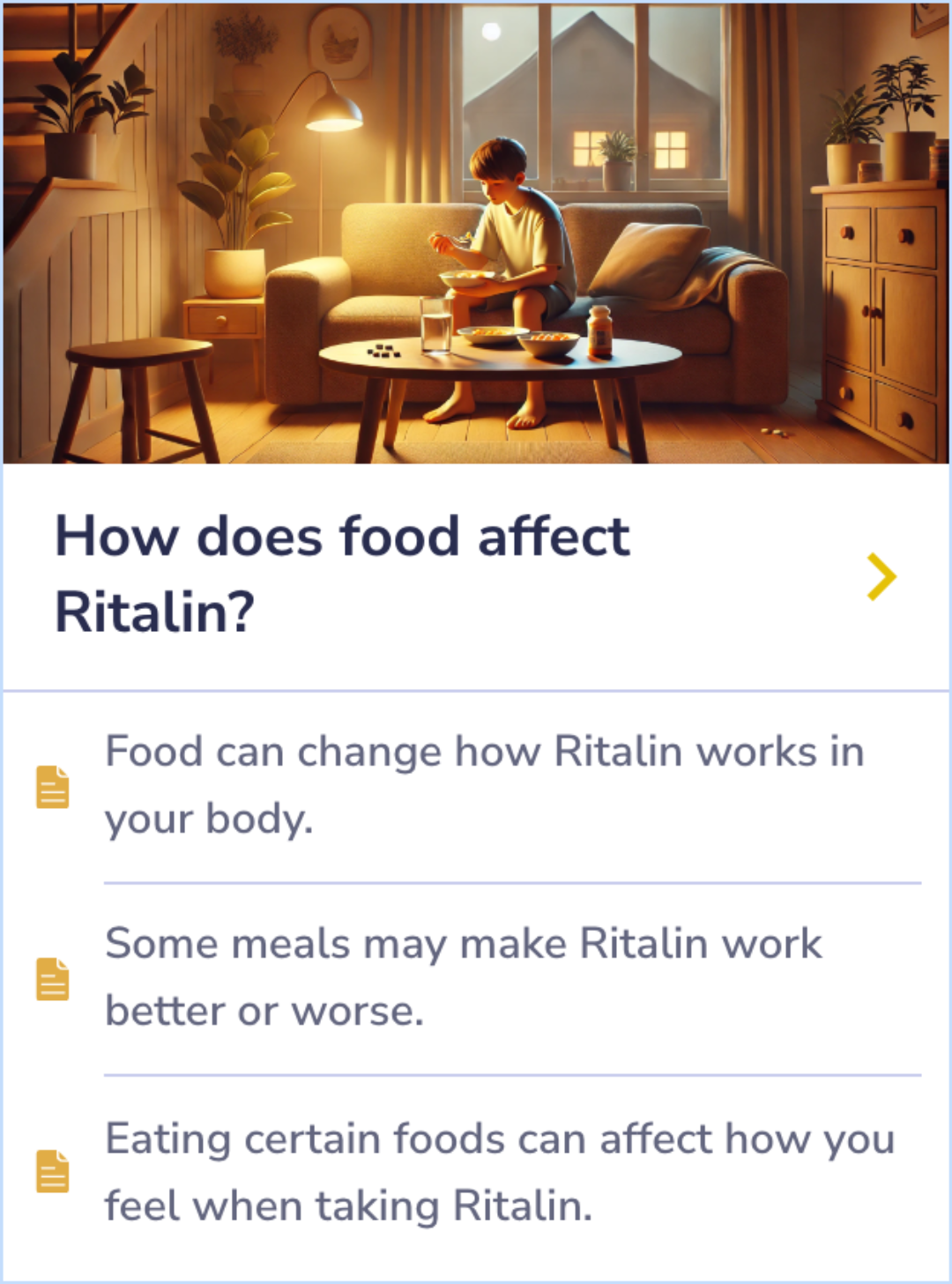Ritalin
Evidence Based Answers
How late is too late for Ritalin?
Without ADHD, Ritalin use can raise risks, altering mood and focus, leading to overstimulation and restlessness.
Published: November 8, 2024
Click to explore a section:

Late Ritalin doses affect sleep; use depends on individual response and formulation type, such as immediate or extended-release.
Background: Adult Instructions
Ritalin is typically taken 30-45 minutes before a meal, and the daily dosage is split between 2-3 times per day. This ensures that the medication's effects are evenly distributed throughout the day for adults.
If taken too late in the day, it might cause difficulties in sleeping due to its 8-hour duration of action. Adjusting the timing of doses can help manage sleep-related side effects.
If taken too late in the day, it might cause difficulties in sleeping due to its 8-hour duration of action. Adjusting the timing of doses can help manage sleep-related side effects.
Personal Experiences
Perspectives: Taking Ritalin Too Late?
In discussions about taking Ritalin late, people emphasize caution with timing.
Some suggest avoiding late doses to prevent insomnia, while others note that individual responses vary, especially between immediate-release and extended-release forms.
Some suggest avoiding late doses to prevent insomnia, while others note that individual responses vary, especially between immediate-release and extended-release forms.
Reddit: u/stickypoodle
I was advised to avoid taking Ritalin late, especially if I missed a dose, as it can disrupt sleep. Preparing for the next day is better...Timing Ritalin to Avoid Sleep Issues
When taken too late in the day, Ritalin can cause trouble sleeping, like insomnia or restlessness. Evening doses can particularly affect those sensitive to its stimulant effects.
To help manage these effects, patients are often advised to take their last dose earlier in the day, such as before 6 p.m., allowing time for the effects to reduce before bedtime.
To help manage these effects, patients are often advised to take their last dose earlier in the day, such as before 6 p.m., allowing time for the effects to reduce before bedtime.
“
Source Quotes:
Patients who are unable to sleep if medication is taken late in the day should take the last dose before 6 p.m.
Insomnia and nervousness are the most commonly reported adverse effects in patients using methylphenidate.
How Ritalin Timing Affects Evening Activities
The timing of Ritalin's effects depends on its formulation. Immediate-release versions act quickly but wear off sooner, while extended-release forms can last up to 8 hours, potentially affecting evening activities.
Those on extended-release Ritalin may benefit from adjusting the timing to avoid effects that might interfere with sleep at night.
Those on extended-release Ritalin may benefit from adjusting the timing to avoid effects that might interfere with sleep at night.
“
Source Quotes:
Ritalin-SR tablets have a duration of action of approximately 8 hours.
The plasma concentrations of d-methylphenidate (>5 ug/L) and l-methylphenidate (>0.5 ug/L) were sustained for 8 hours following drug administration.
Individual Variability in Ritalin's Evening Effects
People respond to Ritalin differently, which makes evening doses unpredictable. Some experience insomnia, while others find low doses in the evening calming and helpful for sleep.
Those who find an evening dose beneficial often use a short-acting version to limit the effects, but timing and dosage vary based on individual needs.
Those who find an evening dose beneficial often use a short-acting version to limit the effects, but timing and dosage vary based on individual needs.
“
Source Quotes:
Notably, some patients may find it beneficial to take low doses of short-acting MPH in the evening, in order to become more peaceful and, hence, more likely to fall asleep (Kooij 2013; Mattingly et al. 2020).
There is a great deal of individual variability in response to methylphenidate, and therefore dosage must be titrated for optimal effects in each child, avoiding possible adverse effects.
Key Takeaways
Conclusions
Taking Ritalin too late in the day can hinder sleep due to its stimulant effects, leading to issues like insomnia and restlessness.
Both immediate and extended-release formulations require careful timing, as extended-release versions may remain active up to 8 hours, exacerbating late-day side effects.
Responses to evening doses are individualized, necessitating tailored timing to manage symptoms without disturbing sleep.
Both immediate and extended-release formulations require careful timing, as extended-release versions may remain active up to 8 hours, exacerbating late-day side effects.
Responses to evening doses are individualized, necessitating tailored timing to manage symptoms without disturbing sleep.

Evidence Summary
Timing Ritalin’s Peak Effect for Best Results
Ritalin generally reaches its peak effect between 1 to 2 hours after taking it, though this timing can vary based on personal factors, such as metabolism.
Doctors may fine-tune doses to help individuals experience Ritalin’s effects at the most beneficial time for their needs, adjusting as necessary to find the right balance for each person.
Doctors may fine-tune doses to help individuals experience Ritalin’s effects at the most beneficial time for their needs, adjusting as necessary to find the right balance for each person.
Evidence Summary
How Methylphenidate Influences Impulsivity
Three studies explore methylphenidate’s effects on impulsivity, focusing on behavior and decision-making. Each study examines different ways this medication, known as Ritalin or Concerta, might influence impulsive actions.
Results vary across the studies, showing both potential benefits and some limitations in using methylphenidate to manage impulsive behavior, reflecting a complex picture of its impact on impulsivity.
Results vary across the studies, showing both potential benefits and some limitations in using methylphenidate to manage impulsive behavior, reflecting a complex picture of its impact on impulsivity.
Evidence Summary
How Food Influences Ritalin’s Effects
Different types of meals can affect how Ritalin interacts with your body, sometimes strengthening or weakening its impact. Eating certain foods can also influence how you feel while taking the medication, as these changes can alter how Ritalin works.
Adjusting your diet may make a difference in how Ritalin affects you, especially if consistency is a goal. For some, a specific meal routine could lead to steadier effects, echoing the idea of reliable dosing patterns discussed earlier.
Adjusting your diet may make a difference in how Ritalin affects you, especially if consistency is a goal. For some, a specific meal routine could lead to steadier effects, echoing the idea of reliable dosing patterns discussed earlier.


